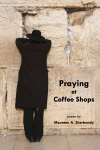Praying at Coffee Shops
One indication that a book is worth reading is the number of notes made in the margins, and I ended up with quite a few scribblings all over the clean, short poems of Maureen A. Sherbondy. Praying at Coffee Shops, with the striking cover image of a Jew praying at the Wailing Wall, suggests it will be about the modern Jew finding her place in the world. While essentially true, the stark image of close-eyed prayer belies the nuance, humor, and worldliness that come through in these poems. Nowhere is this more clearly exemplified than the title poem, whose full name is “Praying at Coffee Shops in the South”:
One indication that a book is worth reading is the number of notes made in the margins, and I ended up with quite a few scribblings all over the clean, short poems of Maureen A. Sherbondy. Praying at Coffee Shops, with the striking cover image of a Jew praying at the Wailing Wall, suggests it will be about the modern Jew finding her place in the world. While essentially true, the stark image of close-eyed prayer belies the nuance, humor, and worldliness that come through in these poems. Nowhere is this more clearly exemplified than the title poem, whose full name is “Praying at Coffee Shops in the South”:
What are these public interludes with God?
Two men at Starbucks holding hands
bent over in prayer, leaning into the invisible.
…
My mother said no kissing in public places
but here they are –
pressing lips against java-infused air,
searching for the mouth of God.
In 22 short meditations, Sherbondy weaves in and out of her private spirituality and the interaction forced on her and her heritage by a world that both needs and doesn’t understand Judaism’s strength. Poems touching on Christian and Nazi oppression later give way to ones on Southern “hospitality” in what, sadly, seems like a natural progression.
The lead poem, “Tashlich,” is a very effective evocation on the ceremony of casting off sins by throwing pebbles into the water. Utilizing the line breaks for most of the grammar, the extra stanza in the ending renders the sense of an endless loop through the near-symmetry, yet also gives the greater weight to the guilt that perhaps builds with each iteration:
How many sins
have you swallowed
dead salmon.
…
How do we live
with our sins
that return –
a small pebble
caught in the back
of our throat.
With only a handful of WWII veterans and survivors left, the most infamous genocide in recent memory has been alarmingly fading in much of our collective consciousness. Sherbondy jerks us back with a few stories based on relatives, like the poem about a cousin who snuck potatoes to avoid starvation at a concentration camp:
Her dreams are filled
with nightmares.
She sees sacks and sacks of potatoes,
peels floating on top of red water,
and all those dead eyes.
There are a few poems in the middle touching on Tikkun Olam, or Repair of the World. While the focus on acts has long been a primary manifestation of devotion for moderates, it unfortunately doesn’t translate into the most interesting poetry here. Perhaps it is wrong to wish for something more flashy, but these dreamy wishes of healing the world take on more than they can support. Fortunately, the bulk of the book is less generalized, and it’s in the more specific poems that Sherbondy shows her greatest strength, allowing her a density of implication through choice word selection, reference, and subtext.
Sherbondy has a pretty good ear, and one tool she uses is a pseudo-nursery rhyme to accent a sort of return to childhood or render a riddle. Consider these lines from “Deconstructing Our Daily Bread,” a poem about a man who has taken to picking holes in bread:
But do you know that bread
means pieces or bits?
and dear Motzi Feldman
who sits in prison
waiting for the court’s decision,
I think you knew, and made the bread appear
as it should be, by ripping today’s definition
into bits, leaving crumbs behind as clues.
Sherbondy is far too modern and earnest for this book to be perceived as a Jewish rant. The ripples of dissent and resentment arise organically from a continual pursuit of her own spirituality, and the ordering of these poems functions well to maintain that interpretation. All in all, Praying at Coffee Shops is marvelously effective poetry, full of little realizations and multiple layers of meaning that the best poetry delights us with. Having also just released After the Fairy Tale, a wonderful collection in a similar spirit, it’s clear that Maureen A. Sherbondy will provide great reading for the foreseeable future.





